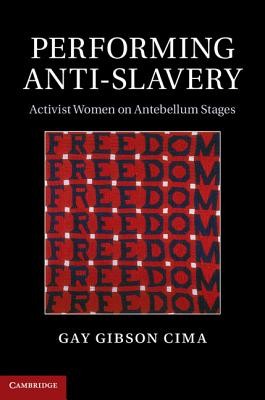
- We will send in 10–14 business days.
- Author: Gay Gibson Cima
- Publisher: Cambridge University Press
- ISBN-10: 1107060893
- ISBN-13: 9781107060890
- Format: 15 x 22.9 x 2.5 cm, hardcover
- Language: English
- SAVE -10% with code: EXTRA
Reviews
Description
In Performing Anti-Slavery, Gay Gibson Cima reimagines the connection between the self and the other within activist performance, providing fascinating new insights into women's nineteenth-century reform efforts, revising the history of abolition, and illuminating an affective repertoire that haunts both present-day theatrical stages and anti-trafficking organizations. Cima argues that black and white American women in the nineteenth-century abolitionist movement transformed mainstream performance practices into successful activism. In family circles, literary associations, religious gatherings, and transatlantic anti-slavery societies, women debated activist performance strategies across racial and religious differences: they staged abolitionist dialogues, recited anti-slavery poems, gave speeches, shared narratives, and published essays. Drawing on liberal religious traditions as well as the Eastern notion of transmigration, Elizabeth Chandler, Sarah Forten, Maria W. Stewart, Sarah Douglass, Lucretia Mott, Ellen Craft and others forged activist pathways that reverberate to this day.
EXTRA 10 % discount with code: EXTRA
The promotion ends in 18d.12:03:47
The discount code is valid when purchasing from 10 €. Discounts do not stack.
- Author: Gay Gibson Cima
- Publisher: Cambridge University Press
- ISBN-10: 1107060893
- ISBN-13: 9781107060890
- Format: 15 x 22.9 x 2.5 cm, hardcover
- Language: English English
In Performing Anti-Slavery, Gay Gibson Cima reimagines the connection between the self and the other within activist performance, providing fascinating new insights into women's nineteenth-century reform efforts, revising the history of abolition, and illuminating an affective repertoire that haunts both present-day theatrical stages and anti-trafficking organizations. Cima argues that black and white American women in the nineteenth-century abolitionist movement transformed mainstream performance practices into successful activism. In family circles, literary associations, religious gatherings, and transatlantic anti-slavery societies, women debated activist performance strategies across racial and religious differences: they staged abolitionist dialogues, recited anti-slavery poems, gave speeches, shared narratives, and published essays. Drawing on liberal religious traditions as well as the Eastern notion of transmigration, Elizabeth Chandler, Sarah Forten, Maria W. Stewart, Sarah Douglass, Lucretia Mott, Ellen Craft and others forged activist pathways that reverberate to this day.


Reviews